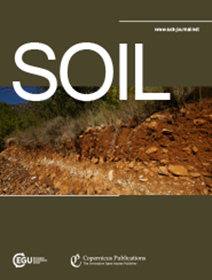土壤有机碳矿化受外源有机物施用剂量的控制
IF 4.3
2区 农林科学
Q1 SOIL SCIENCE
引用次数: 0
摘要
摘要。要抵消全球变暖导致的耕地土壤有机碳储量预计下降,可能需要大量输入外源有机物(EOM)。然而,有关外源有机质施用剂量在保护土壤有机碳储量方面效果的信息却非常有限。因此,我们在大体积土壤(沙壤土和粉砂壤土)中进行了为期 90 天的培养实验,比较了三种 EOM 施用剂量(0.5、1.5 和 5 克干物质 kg-1 土壤)对 EOM(13C 标记黑麦草)和 SOC 矿化作用的影响。在沙壤土中,矿化 EOM 的百分比不受 EOM 剂量的影响,而 SOC 的矿化则随着 EOM 剂量的增加而成正比增加(每克 EOM 含 +49.6 毫克 C)。在淤泥质壤土中,矿化的 EOM 百分比随着剂量的增加而有所下降,而 SOC 矿化率的增加则高于砂质壤土(每克 EOM 含 +117.2 毫克 C)。在这两种质地的土壤中,增加 EOM 的剂量可能会为微生物的生长和酶的产生提供能量,进而刺激本地 SOC 的矿化(即共代谢)。在淤泥质壤土中,EOM剂量越高,土壤大孔隙度越高,这可能有助于维持有氧条件(以土壤Eh为指标)和促进SOC引诱,孔颈尺寸等级43-60、60-100和>300 μm与SOC引诱之间的正相关关系表明了这一点,为理解SOC引诱提供了一种新的机制。总之,本实验和我们之前的研究表明,EOM矿化大多与EOM剂量无关,但EOM剂量会调节原生SOC的矿化。这些发现初步表明,使用较大剂量的EOM有助于在淤泥质壤土中保留更多的EOM-C,但在得出土壤C管理的结论之前,我们首先需要在田间进行更长期的验证。本文章由计算机程序翻译,如有差异,请以英文原文为准。
Soil organic carbon mineralization is controlled by the application dose of exogenous organic matter
Abstract. Substantial input of exogenous organic matter (EOM) may be required to offset the projected decline in soil organic carbon (SOC) stocks in croplands caused by global warming. However, information on the effectivity of EOM application dose in preserving SOC stocks is surprisingly limited. Therefore, we set up a 90-day incubation experiment with large soil volumes (sandy loam and silt loam) to compare the mineralization of EOM (13C-labelled ryegrass) and SOC as a function of three EOM application doses (0.5, 1.5, and 5 g dry matter kg-1 soil). In the sandy loam soil, the percentage of mineralized EOM was not affected by EOM dose, while SOC mineralization increased proportionally with increasing EOM dose (+49.6 mg C per g EOM). In the silt loam soil, the percentage of mineralized EOM decreased somewhat with increasing dose, while SOC mineralization increased at a higher rate than in the sandy loam soil (+117.2 mg C per g EOM). In both textured soils, increasing EOM dose possibly supplied energy for microbial growth and enzyme production, which in turn stimulated mineralization of native SOC (i.e. co-metabolism). Higher soil macroporosity at higher EOM doses in the silt loam soil could have contributed to sustaining aerobic conditions (indicated by soil Eh) and promoting SOC priming as shown by positive relationships between pore neck size classes 43–60, 60–100 and >300 μm and SOC priming, suggesting a new mechanism for understanding SOC priming. In sum, this experiment and our previous research suggest that EOM mineralization is mostly independent of EOM dose, but EOM dose modulates mineralization of native SOC. These findings tentatively indicate that using larger EOM doses could help preserve more of added EOM-C in silt loam soils, but longer-term confirmation in the field will firstly be required before we could draw any conclusion for soil C management.
求助全文
通过发布文献求助,成功后即可免费获取论文全文。
去求助
来源期刊

Soil
Agricultural and Biological Sciences-Soil Science
CiteScore
10.80
自引率
2.90%
发文量
44
审稿时长
30 weeks
期刊介绍:
SOIL is an international scientific journal dedicated to the publication and discussion of high-quality research in the field of soil system sciences.
SOIL is at the interface between the atmosphere, lithosphere, hydrosphere, and biosphere. SOIL publishes scientific research that contributes to understanding the soil system and its interaction with humans and the entire Earth system. The scope of the journal includes all topics that fall within the study of soil science as a discipline, with an emphasis on studies that integrate soil science with other sciences (hydrology, agronomy, socio-economics, health sciences, atmospheric sciences, etc.).
 求助内容:
求助内容: 应助结果提醒方式:
应助结果提醒方式:


